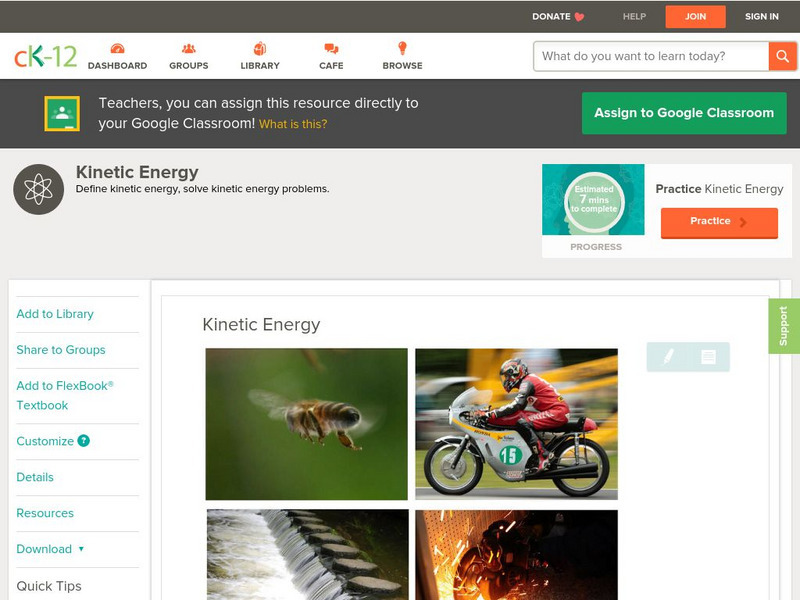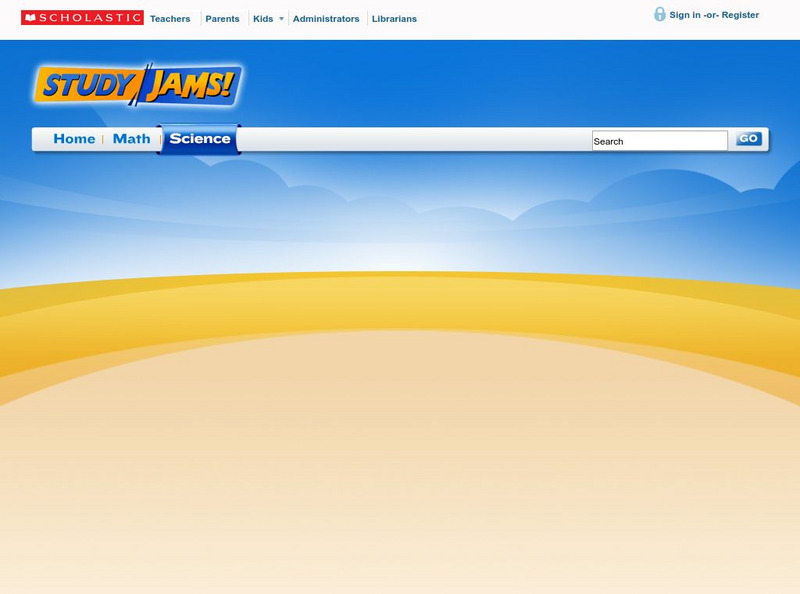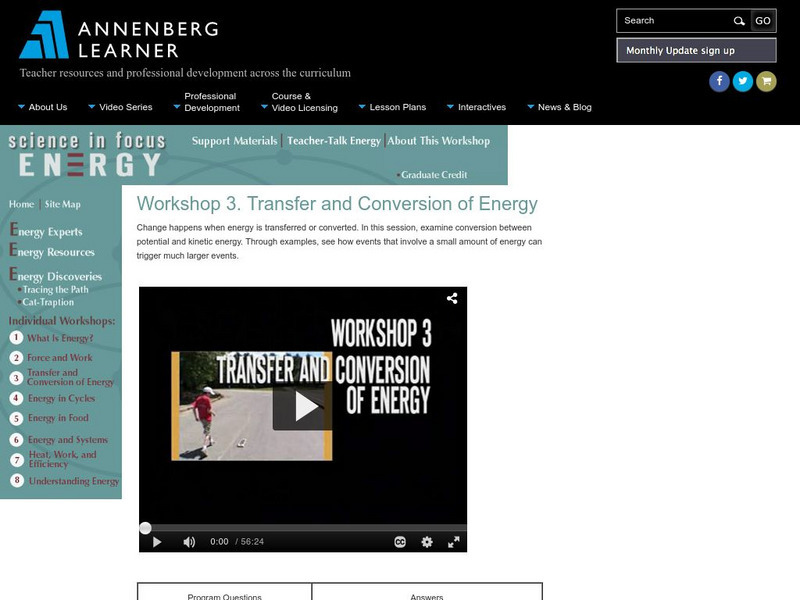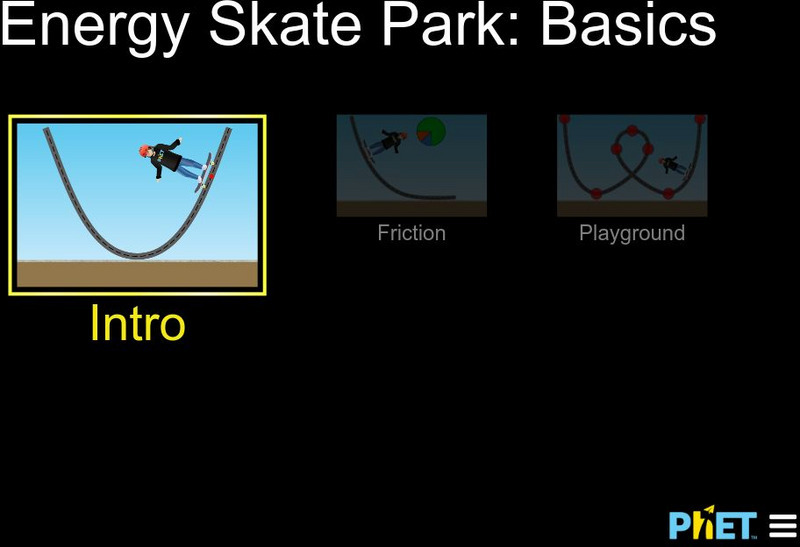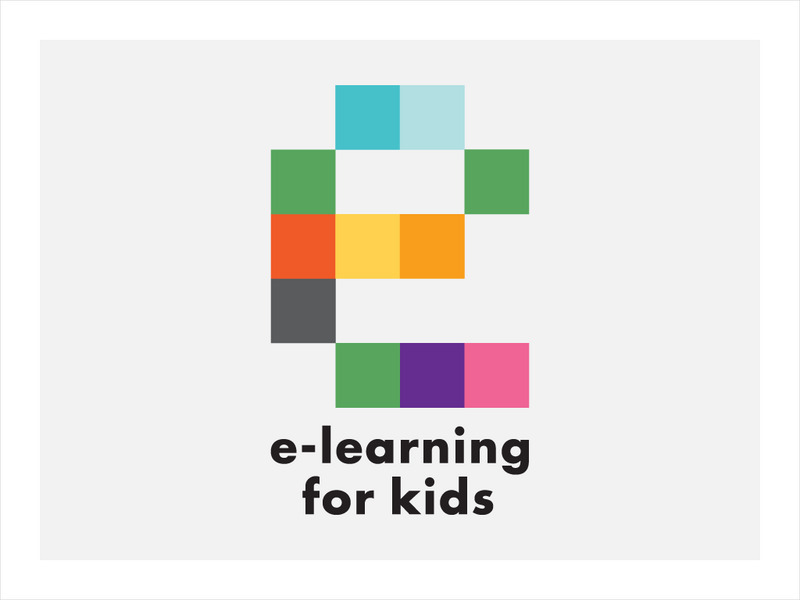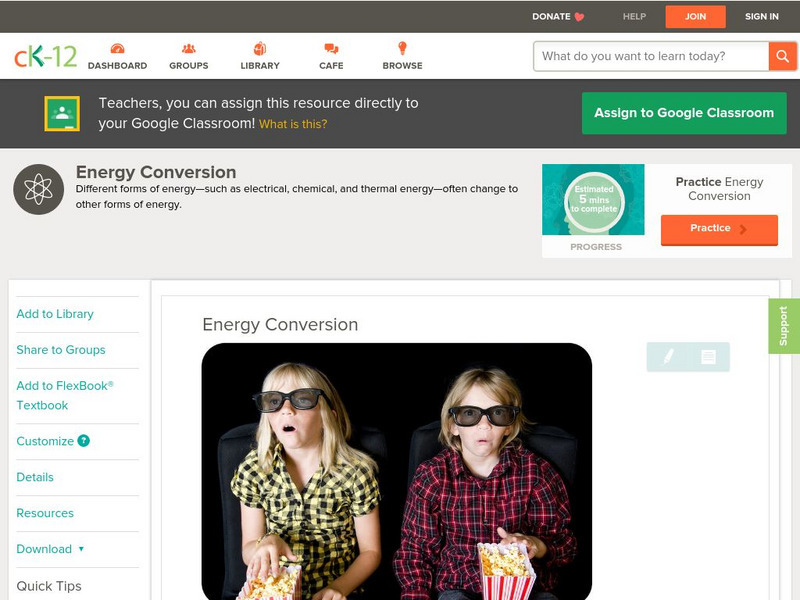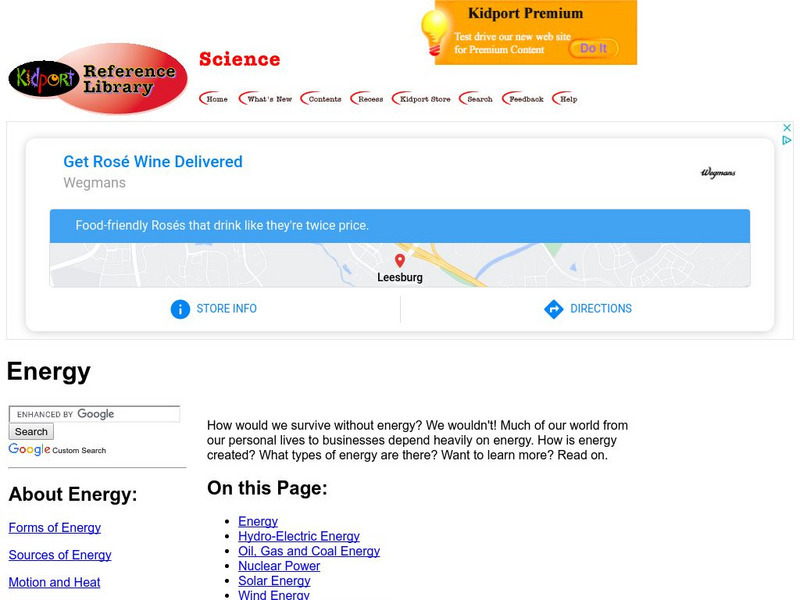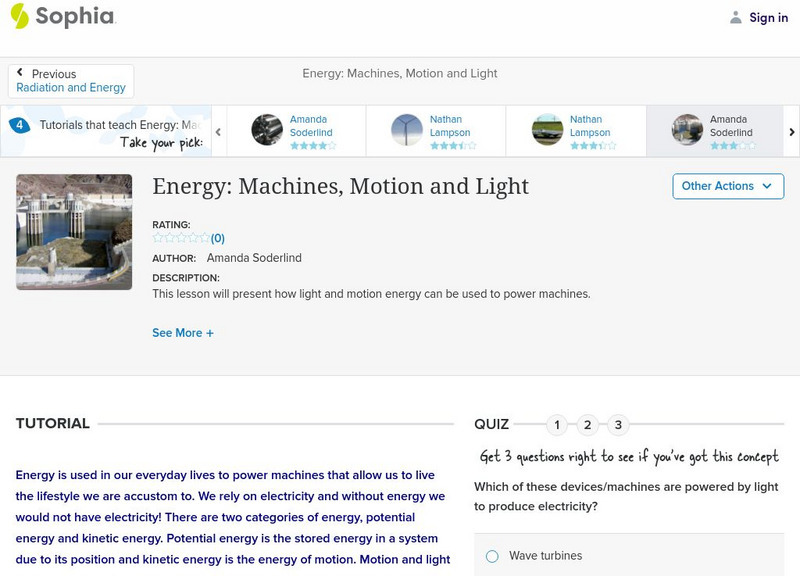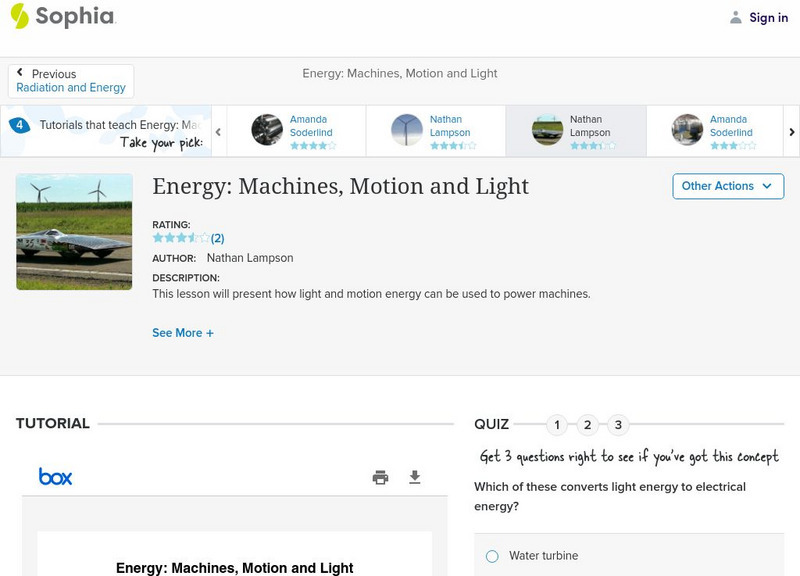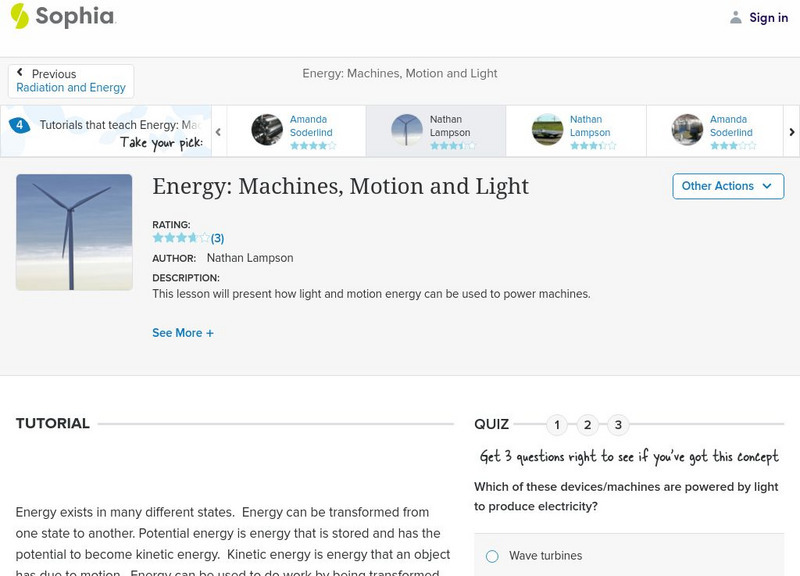CK-12 Foundation
Ck 12: Physical Science: Kinetic Energy
[Free Registration/Login may be required to access all resource tools.] Definition of kinetic energy and how to calculate it.
Khan Academy
Khan Academy: What Is Kinetic Energy?
Learn what kinetic energy means and how it relates to work.
Scholastic
Scholastic: Study Jams! Science: Matter: Energy & Matter
A video and a short quiz on the different forms of energy, and how energy moves or changes matter.
CK-12 Foundation
Ck 12: Physical Science: Kinetic Theory of Matter
[Free Registration/Login may be required to access all resource tools.] Kinetic theory of matter and how kinetic energy relates to the state of matter.
Ducksters
Ducksters: Physics for Kids: Kinetic Energy
Kids learn about kinetic energy in the science of physics. The energy of motion can be calculated using mass and velocity. The standard unit is the joule. How it is different from potential energy.
Georgia Department of Education
Ga Virtual Learning: Physical Science: Work and Energy
Find out about simple machines, calculate the mechanical advantage and efficiency of machines, differentiate potential and kinetic energy, and learn ways to use energy more efficiently.
Annenberg Foundation
Annenberg Learner: Science in Focus: Energy: Transfer and Conversion of Energy
Change happens when energy is transferred or converted. Included with the teaching unit, is a sixty-minute video that examines the conversion between potential and kinetic energy.
University of Colorado
University of Colorado: Ph Et Interactive Simulations: Energy Skate Park
Explore kinetic, potential, and thermal energy as you send a skateboarder along several pre-built tracks, then design your own. Charts and graphs show the distribution of the different forms of energy, illustrating how the total energy...
E-learning for Kids
E Learning for Kids: Science: Antilles: What Are the Different Forms of Energy?
Students will learn about the different types and sources of energy, including heat and light, electrical, potential, and kinetic energy.
Canada Science and Technology Museum
Canada Science and Technology Museum: Background Information for Energy
Energy! What do you know about it? Use this terrific site to find out everything about it through a series of Q&As. Educators will find useful lesson plans at the related Teacher's site.
Science Museum of Minnesota
Science Museum of Minnesota: Thinking Fountain: Friction
The Thinking Fountain provides this simple experiment for understanding friction and it relationship to energy.
Georgia Department of Education
Ga Virtual Learning: Ap Chemistry: Kinetics and Equilibrium
Through interactive activities in a module format, students learn about kinetics, collision theory, reaction rates, and rate laws. They will calculate rate laws from experimental data, concentration and time, and half-life of a reaction....
E-learning for Kids
E Learning for Kids: Science: Pirates: What Is Energy Conversion?
This lesson covers the different types of energy, the definitions of kinetic and potential energy, how energy can be converted into different forms, and the law of conservation of energy.
Museum of Science
Museum of Science and Industry: Online Science: Activities: Make a Comeback Can
Step-by-step instructions, with photos, of how to make a metal can come back when it is sent rolling away. The can uses both kinetic and potential energy to roll away and back.
Ducksters
Ducksters: Physics for Kids: Potential Energy
Kids learn about potential energy in the science of physics. The energy of position and state can be calculated using mass, gravity, and height. The standard unit is the joule. How it is different from kinetic energy.
University of Colorado
University of Colorado: Ph Et Interactive Simulations: Masses & Springs
Hang various mass weights on spring scales while you adjust the spring stiffness and damping in this online activity. Slow down the action, take it to another planet, or watch the amount of potential, thermal, and kinetic energy.
Museum of Science
Museum of Science and Industry, Chicago: Activities: Build a Roller Coaster
Build the roller coaster, then keep making adjustments to see how it affects the potential and kinetic energy of the marble along its tracks.
CK-12 Foundation
Ck 12: Physical Science: Energy Conversion
[Free Registration/Login may be required to access all resource tools.] Decribes how energy changes from one form to another and energy changes between kinetic and potential energy.
Museum of Science
Museum of Science and Industry Chicago: Online Science: Drop Eggs Into Cups
Step-by-step illustrated instructions showing how to drop four eggs into four cups without touching them. Demonstrates the concept of inertia according to Newton's first law of motion.
Kidport
Kidport Reference Library: Energy
A simple introduction to energy, offering information on hydro-electric energy, fossil fuels, nuclear power, solar energy, and wind energy.
Sophia Learning
Sophia: Energy: Machines, Motion and Light: Lesson 3
This lesson will present how light and motion energy can be used to power machines. It is 3 of 4 in the series titled "Energy: Machines, Motion and Light."
Sophia Learning
Sophia: Energy: Machines, Motion and Light: Lesson 4
This lesson will present how light and motion energy can be used to power machines. It is 4 of 4 in the series titled "Energy: Machines, Motion and Light."
Sophia Learning
Sophia: Energy: Machines, Motion and Light: Lesson 2
This lesson will present how light and motion energy can be used to power machines. It is 2 of 4 in the series titled "Energy: Machines, Motion and Light."
The Tech Interactive
The Tech Museum of Innovation: Save the Hiker [Pdf]
Can you build a device that will deliver life-saving treatment to someone in a hazardous situation? During this lesson, students will learn how energy is converted and transferred between objects. Working in groups and through the...
